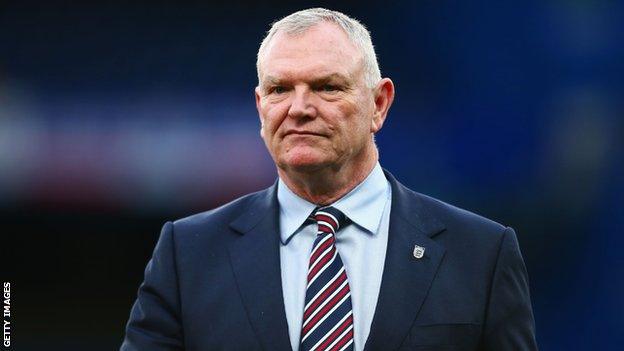Football Association board diversity plans blocked by professional game - Greg Clarke
- Published

Greg Clarke was appointed Football Association chairman in September 2016
Football Association chairman Greg Clarke says he is "disappointed" after claiming the professional game representatives on the FA board blocked a move to try to improve the diversity of its members.
In a letter to the FA Council,, external Clarke said a number of options were discussed at last week's board meeting, including making Paul Elliott - chair of the Inclusion Advisory Board - a director.
He says the representatives of the EFL and Premier League "were against such a review".
He later said in a statement that he had "not intended to be divisive" in the letter and that he "intended to highlight an issue that we all care deeply about across both the FA Board and the FA Council".
He said: "Following high-level talks between all parties today, I recognise now that the views held by the members of the board were not as they first appeared, and that all parties do support a review of FA Board diversity."
A Premier League and EFL joint statement on Tuesday said Clarke's letter "did not reflect the true nature of the discussions held at the FA Board meeting last week" and they said they welcomed his clarification.
The statement added: "It was agreed at last week's FA Board meeting to undertake an evaluation of diversity and inclusion within the FA in a consultative but efficient manner."
Writing to the FA Council Clarke had said: "Without the support of the professional game and national game, who have a majority of directors, a review of the FA board composition is not possible.
"I had hoped that the FA, as the game's governing body, would have been able to examine whether its own board was appropriately constituted to represent a diverse game and share its thinking with council. This process is happening across football but will not now happen with respect to the FA board."
He added: "As FA chairman this disappoints me".
Other options discussed included giving the professional and national Games an extra board seat each "that could provide the flexibility to allow appointment of diverse candidates should they be the best qualified person for the role."
Clarke also said: "Both our independent directors offered to stand down to create opportunities for a more diverse board but the board was united in declining their offer."
BBC Sport spoke to one board member who described Clarke's statement as "bizarre" and "divisive" and said he had been urged not to issue it by members of the board this morning when he made them aware of his plans.
A Premier League source has told the BBC it is not opposed to a review but it has to be a review, followed by consideration and change, not random declarations by Clarke.
There are three representatives of the professional game on the FA board - former Premier League chairman Peter McCormick, who is chair of its legal advisory group, English Football League chairman Rick Parry and lawyer Rupinder Bains, who jointly represents the Premier League and the EFL.
The reforms in 2017, which they deemed sufficient, led to BAME representation on the board reaching 10%, 10% representation from the LGBT+ community and 40% representation by women.
The Premier League has shown its solidarity, with players' names replaced on the back of their shirts with 'Black Lives Matter' for the first 12 matches of the restarted season, and a Black Lives Matter badge will feature on all shirts for the rest of the campaign.
Several high-profile players, including Manchester City winger Raheem Sterling, have called for greater diversity in the hierarchy of sports organisations following the the Black Lives Matter campaign.
Kick It Out chair Sanjay Bhandari said: "Black Lives Matter has rightfully caused organisations across all industries to consider how they attack systemic inequalities and better reflect society.
"That process must start at the top with the senior leadership team. It is only right that the FA should seek to seize the moment, to reflect on the composition of its leadership team and whether it represents the players, fans and participants in the game.
"I applaud Greg Clarke's effort to do so. It is disappointing that this effort has been rejected. Before commenting further, we would need to understand better the professional game's reasons for rejecting a review."

Football Daily: Reaction from a dramatic end to the Premier League season
Alhan's World: Grime MC JME joins to talk family life in the age of coronavirus
